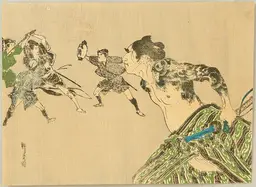
The Yakuza is a criminal organization that can be traced back to Japan’s feudal era. Over the years, they have evolved into a powerful and feared syndicate that engages in a variety of illegal activities. They became a multi-billion dollar criminal enterprise, with revenues coming in from drug trafficking, gambling, prostitution, and extortion. In addition they are also involved in legitimate businesses such as construction, real estate, and finance.
Yakuza Organizational Structure
The Yakuza has a strict code of conduct that is supposedly based on honour, loyalty, and respect. Its members are known for their elaborate tattoos and their use of violence to resolve disputes.
The Yakuza is not a centralized organization, but rather is made up of several smaller gangs, or “families,” each with its own territory and sphere of influence. Membership is open to both men and women, although the vast majority of members are male. There are an estimated 80,000-100,000 Yakuza members in Japan, with another 500,000+ associates.
Origins and History
The criminal organisation first emerged during Japan’s Edo period (1603-1868). At that time, they were known as the bakuto, which translates to “gamblers.” The bakuto were involved in a variety of criminal activities, including gambling, prostitution, and theft. They were considered to be very dangerous and were feared by the general population.
During the Meiji period (1868-1912), the bakuto began to engage in more organised crime. They formed gangs, and began to extort money from businesses and individuals. In 1892, the first Yakuza syndicate was formed in Osaka. This syndicate, known as the Sumiyoshi-kai, is the oldest and most powerful Yakuza syndicate in Japan, and it is still in operation today. It was formed by four former bakuto, called the “Four Kings of Osaka.” The Sumiyoshi-kai is in fact headquartered in Osaka, and has a membership of around 10,000 people. It is involved in a variety of criminal activities, including gambling, drugs, prostitution, and loan sharking.
The Yakuza continued to grow in power and influence during the Taisho period (1912-1926). They began to branch out into other criminal activities such as drugs, and arms smuggling. They also became involved in politics, and began to bribe politicians in order to gain favours. This is when they started their international expansion, forming alliances with other criminal organisations, such as the Italian Mafia and the Chinese Triads.
During the Showa period (1926-1989), the Yakuza reached the height of their power. They controlled large portions of Japan’s economy, and had a major influence over politics and law enforcement. The Yakuza were involved in many high-profile crimes, such as the kidnapping of Japanese industrialist, Yaichiro Tsutsumi in 1963.
Crackdown by the Authorities
In recent years, the Japanese government has cracked down on the organization, and public opinion of the Yakuza is at an all-time low. In 2003, the Yakuza was officially recognized as a criminal organization by the Japanese government. This designation made it easier for law enforcement to prosecute members and disrupt their activities.
The Yakuza is now going through a period of decline. New laws and law enforcement initiatives have made it difficult for them to operate. In addition, many Japanese people have turned their backs on the Yakuza, and no longer support their activities.
Despite their decline, the Yakuza remains a powerful and feared criminal organization. They are still involved in many illegal activities, and continue to be a major problem for law enforcement in Japan.
The Battle for Sicily’s Soul – Order from your Favourite Retailer Below
Disclosure: Please note that some of the links in this post are affiliate links. When you use one of these affiliate links, the company compensates us. At no additional cost to you, we will earn a commission, which helps us run this blog and keep our in-depth content free of charge for all our readers.
